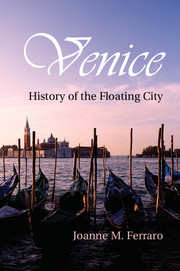Book contents
- Frontmatter
- Contents
- Plates
- Illustrations
- Maps
- Acknowledgments
- Preface
- Chronology of Historical Events
- 1 Reconstructing the Floating City
- 2 The Riches of Asia, Europe, and North Africa
- 3 A Pride of Lions
- 4 Identities and Modes of Socialization
- 5 Material Life
- 6 City of Myth
- 7 The Serenissima’s Wayward Subjects
- 8 The Baroque Stage
- 9 Epilogue
- Appendix I Approximate Population of Venice during the Republic
- Appendix II Population of the Historic Center of Venice, 1871–2010
- Glossary
- Notes
- Bibliography
- Index
- Plate Section
- References
6 - City of Myth
Published online by Cambridge University Press: 05 August 2012
- Frontmatter
- Contents
- Plates
- Illustrations
- Maps
- Acknowledgments
- Preface
- Chronology of Historical Events
- 1 Reconstructing the Floating City
- 2 The Riches of Asia, Europe, and North Africa
- 3 A Pride of Lions
- 4 Identities and Modes of Socialization
- 5 Material Life
- 6 City of Myth
- 7 The Serenissima’s Wayward Subjects
- 8 The Baroque Stage
- 9 Epilogue
- Appendix I Approximate Population of Venice during the Republic
- Appendix II Population of the Historic Center of Venice, 1871–2010
- Glossary
- Notes
- Bibliography
- Index
- Plate Section
- References
Summary
The Politics of Mythmaking
The Venetian turn to the mainland during the fifteenth century signified a great deal more than territorial expansion: annexation of the towns to the west opened up new cultural horizons in letters, science, and the visual arts. Previously the Mediterranean basin, Asia, and the Gothic north greatly influenced Venice’s cultural and intellectual developments. From the fifteenth century, however, the history, literature, and artistic traditions of the Italian peninsula took on new meaning. Greco-Latin and Arabic foundations were thus added to traditions the Venetians had encountered on their trading ventures. The internationally renowned university at Padua offered significant advancements in anatomy, medicine, the mechanical sciences, botany, and agronomy. It also endowed Venice with an auspicious circle of humanists who immortalized Aristotelian philosophy and physical contact with Roman archaeological remains that were scattered throughout the territories. The famous poet Petrarch had given Venice humanism in the mid-fourteenth century, but the fifteenth-century contact with the Italian mainland was heavily responsible for the development of Renaissance culture in the two centuries that followed.
The generation of Venetian patricians growing up after 1430, when mainland expansion was complete, both broadened their spectrum of knowledge and used it to their political advantage. Political writers embellished Venetian culture with Aristotelian ideas and Catholic orthodoxy. Moreover, they sharpened images of the so-called myth of Venice that surfaced in writing around 1380 with claims that the city was encapsulated in timeless stability. They developed an elaborate panegyric and iconography to justify this belief. To begin, it was alleged that the entire community of ered unquestioned loyalty to the city, an assertion that recalled the ideals of the Greek polis, where even family dynasty but certainly individual interests were sacrificed for the good of the whole. In addition to the devotion of the people, humanists wrote, Venice also enjoyed special favors: from God and from Saint Mark, whose relics protected the city and whose images adorned churches and civic monuments. Still further, they reiterated that Venice was blessed with excellent rulers and superior institutions, including a citizen navy. Venetian nobles were, according to the humanist Lauro Quirini, the direct descendants of the Romans who established political institutions modeled on the revered Roman Republic. This ideal nobility was immune to factionalism and pure of blood. Venice’s great family dynasts were especially born to govern, and they brought only harmony and liberty to their peoples.
- Type
- Chapter
- Information
- VeniceHistory of the Floating City, pp. 125 - 150Publisher: Cambridge University PressPrint publication year: 2012

